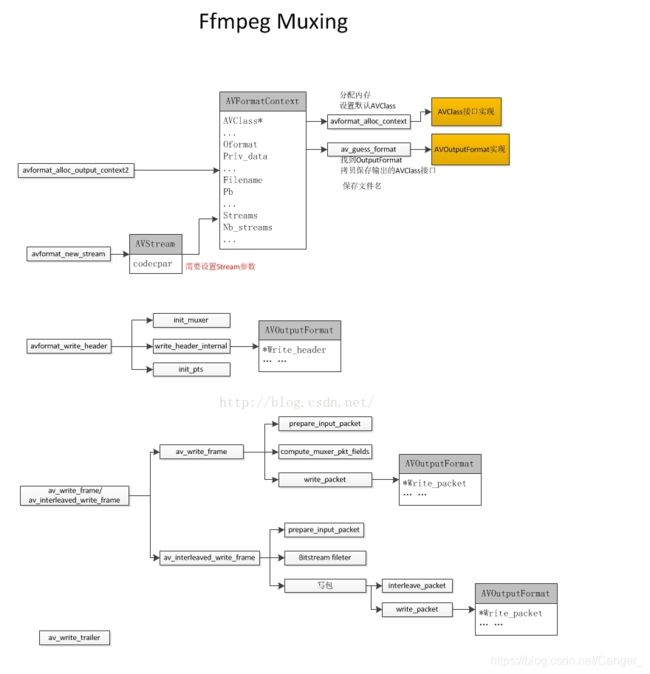- Python 实现图片裁剪(附代码) | Python工具
剑客阿良_ALiang
前言本文提供将图片按照自定义尺寸进行裁剪的工具方法,一如既往的实用主义。环境依赖ffmpeg环境安装,可以参考我的另一篇文章:windowsffmpeg安装部署_阿良的博客-CSDN博客本文主要使用到的不是ffmpeg,而是ffprobe也在上面这篇文章中的zip包中。ffmpy安装:pipinstallffmpy-ihttps://pypi.douban.com/simple代码不废话了,上代码
- windows下python opencv ffmpeg读取摄像头实现rtsp推流 拉流
图像处理大大大大大牛啊
opencv实战代码讲解视觉图像项目windowspythonopencv
windows下pythonopencvffmpeg读取摄像头实现rtsp推流拉流整体流程1.下载所需文件1.1下载rtsp推流服务器1.2下载ffmpeg2.开启RTSP服务器3.opencv读取摄像头并调用ffmpeg进行推流4.opencv进行拉流5.opencv异步拉流整体流程1.下载所需文件1.1下载rtsp推流服务器下载RTSP服务器下载页面https://github.com/blu
- pyhon+ffmpeg 常用音视频处理命令
不再游移
ffmpeg音视频python
FFmpeg是多媒体领域的万能工具。只要涉及音视频领域的处理,基本上没有它做不了的事情!通俗点讲,从视频录制、视频编辑再到播放,它都能做!前段时间做了个短视频自动化脚本项目,需要自动处理音视频(包括一些合成、拼接、转场、调色等等),当时做的时候找各种命令还是很痛苦的,因此对用到的所有处理命令做了个汇总,方便以后使用。目录一、获取音频时长二、获取视频信息三、获取视频时长四、多个视频合并五、视频提取视
- bat+ffmpeg批处理图片,图片批量转码
张雨zy
音视频ffmpeg
直接在cmd中输入//批量转码文件for%ain("*.png")doffmpeg-i"%a"-fs1024k"%~na.webp"//删除所有pngdel*.png@echooff表示执行了这条命令后关闭所有命令(包括本身这条命令)的回显。而echooff命令则表示关闭其他所有命令(不包括本身这条命令)的回显,@的作用就是关闭紧跟其后的一条命令的回显脚本完整代码写入脚本中后,需要多加一个%,例如
- ffmpeg批量将tif文件转成jpeg格式
winfredzhang
图像工具ffmpegtifjpeg转换
1、cmd2、切换到安装ffmpeg的路径。3、输入命令:ffmpeg-start_number001-i"D:\ocr\%03d.tif"-start_number001-pix_fmtyuv420p-qscale:v1"D:\ocr\%03d.jpg"结果。
- 使用ffmpeg将pcm格式音频转化为mp3格式音频
布丁小站
ffmpegpcm音视频
voidAudioCode::ENcode(AVCodecContext*cdc_ctx,AVFrame*frame,AVPacket*pkt){intret=0;/*sendtheframeforencoding*/ret=avcodec_send_frame(cdc_ctx,frame);if(ret=0){ret=avcodec_receive_packet(cdc_ctx,pkt);if(
- FFmpeg安装与使用教程
vvvae1234
ffmpeg
FFmpeg是一个强大且灵活的命令行工具,用于处理音频和视频文件。无论是视频格式转换、音频提取还是视频编辑,FFmpeg都能够轻松完成。掌握FFmpeg,将为你的视频处理工作提供极大的便利。在本教程中,我们将详细介绍FFmpeg的安装和使用,包括一些实用的操作案例,帮助你更好地理解如何使用这个强大的工具。2.FFmpeg简介2.1什么是FFmpegFFmpeg是一个开源的音视频处理库,提供了丰富的
- Ubuntu+Qt+SDL2+FFmpeg
DarcyZhou
此文档用于Ubuntu系统中搭建FFmpeg的开发环境。Qt作为开发软件,SDL2是一套开放源代码的跨平台多媒体开发库。1.安装Qt(1)下载版本:qt-opensource-linux-x64-5.9.8.runimage.png(2)安装给文件添加可执行权限:sudochmod-R777qt-opensource-linux-x64-5.9.8.run开始安装:安装过程中选择全部安装即可。(需
- 在CentOS7中通过yum安装ffmpeg
为技术疯狂
1、升级系统sudoyuminstallepel-release-ysudoyumupdate-ysudoshutdown-rnow2、安装NuxDextopYum源由于CentOS没有官方FFmpegrpm软件包。但是,我们可以使用第三方YUM源(NuxDextop)完成此工作。1)CentOS7sudorpm--importhttp://li.nux.ro/download/nux/RPM-G
- 音视频入门基础:WAV专题(11)——FFmpeg源码中计算WAV音频文件每个packet的pts_time、dts_time的实现
cuijiecheng2018
FFmpeg源码分析音视频技术音视频ffmpeg
=================================================================音视频入门基础:WAV专题系列文章:音视频入门基础:WAV专题(1)——使用FFmpeg命令生成WAV音频文件音视频入门基础:WAV专题(2)——WAV格式简介音视频入门基础:WAV专题(3)——FFmpeg源码中,判断某文件是否为WAV音频文件的实现音视频入门基础:W
- FFmpeg编码03——参数设定
ACALJJ32
视频图像处理ffmpeg
编码参数设定//预设编码器参数c->max_b_frames=10;//B帧最大参数intre=av_opt_set(c->priv_data,"preset","ultrafast",0);//设置速度最快编码if(re!=0){qDebug()priv_data,"tune","zerolatency",0);//0延时if(re!=0){qDebug()bit_rate=400000;CQP
- 音视频入门基础:WAV专题(5)——FFmpeg源码中解码WAV Header的实现
cuijiecheng2018
FFmpeg源码分析音视频技术音视频ffmpeg
=================================================================音视频入门基础:WAV专题系列文章:音视频入门基础:WAV专题(1)——使用FFmpeg命令生成WAV音频文件音视频入门基础:WAV专题(2)——WAV格式简介音视频入门基础:WAV专题(3)——FFmpeg源码中,判断某文件是否为WAV音频文件的实现音视频入门基础:W
- java mp3转m4a_轻松在你的Android App中转换音频文件,支持格式:WAV, AAC, MP3, M4A, WMA 和FLAC....
Kada Liao
javamp3转m4a
AndroidAudioConverterConvertaudiofilesinsideyourAndroidappeasily.ThisisawrapperofFFmpeg-Android-Javalib.Supportedformats:AACMP3M4AWMAWAVFLACLibsize:~9mbHowToUse1-AddthispermissionintoyourAndroidManife
- 前端引入ffmepg 对视频画矩形贴图
全赣州最老实的男人guoy
前端音视频ffmpegvue
业务场景:和后端联调中视频监控需要把人员位置框出,返回的后端只给视频和框选位置先上效果图成功给视频添加了两个框demo技术框架vue3+vite+typeScript引入ffmepgnpmi@ffmpeg/ffmpeg2.项目中引入import{createFFmpeg,fetchFile}from'@ffmpeg/ffmpeg/dist/ffmpeg.min.js'3.可能会出现的报错Share
- FFmpeg DASH部分指令参数参考
D_R_M
window_size默认值:int:0—取值范围:[0,int_max]--清单中保留的最大段数extra_window_size默认值:int:5—取值范围:[0,int_max]--从磁盘中删除之前保留在清单外部的最大段数min_seg_duration默认值:int64:5000000取值范围:[0,int_max]--最小段持续时间(以微秒为单位)--默认值:5sremove_at_ex
- ffmpeg一些基本用法
980205
ffmpeg流媒体
来源:ffmpeg一些基本用法|王石头的博客(iwangsen.com)音视频操作,几乎绕不开ffmpeg,因为市面上绝大多数音视频播放软件、转码软件,内核都是它。它非常的强大,轻松几条命令就可以顺利完成你想做的工作我来汇总一些经常使用的命令首先在cmd窗口进入到ffmpeg目录里面最简单的视频格式转换ffmpeg-iD:\Media\IMG_0873.MOV-ccopyD:\Media\outp
- ffmpeg 命令转vp9
980205
ffmpeg
mp4转vp9./ffmpeg-itest.mp4-pix_fmtyuv420p10le-c:vlibvpx-vp9-b:v0-crf31-speed1-qualitygood-static-thresh4 -lag-in-frames25 -fwebmout.webmyuv转vp9,需要指定yuv的高宽//转vp9./ffmpeg-pix_fmtyuv420p-s704*576 -i out.y
- FFMepg av_lockmgr_register
980205
ffmpeg
FFMpeg多路h.264视频用多线程播放有关问题怎么解决FFMpeg多路h.264视频用多线程播放问题如何解决本帖最后由x6wang于2014-10-1014:50:37编辑panfeng_87网友曾经发布过下列问题:“我用类接口的方式封装了ffmpeg,想的是每一个类的实例解码一路视频。类的其他部分没有对公共变量/全局变量的使用,但目前就是不知道ffmpeg中是否使用了一些全局资源或是相关的东
- HPlayer 开源项目安装与使用教程
虞熠蝶
HPlayer开源项目安装与使用教程hplayerAmulti-screenplayerusingQt+FFmpeg.项目地址:https://gitcode.com/gh_mirrors/hp/hplayer项目概述HPlayer是一个由GitHub用户ithewei开发的开源媒体播放器项目。本文档旨在提供详细的指南,帮助开发者和用户理解其内部结构、启动流程以及配置方法,从而更有效地使用或贡献于
- FFmpeg任意文件读取漏洞分析
音视频开发老马
ffmpeg
背景介绍FFmpeg是一套目前非常流行的可以用来记录、转换数字音频、视频,并能将其转化为流的开源计算机程序。它提供了录制、转换以及流化音视频的完整解决方案。目前有非常多的视音频软件或是视频网站、手机APP都采用了这个库,但是这个库历史上曝出的漏洞也非常之多。这次的漏洞是利用了ffmpeg可以处理HLS播放列表的功能,在AVI文件中的GAB2字幕块中嵌入了一个HLS文件,然后提供给ffmpeg进行转
- FFmpeg源码:compute_frame_duration函数分析
cuijiecheng2018
FFmpeg源码分析ffmpeg
一、compute_frame_duration函数的定义compute_frame_duration函数定义在FFmpeg源码(本文演示用的FFmpeg源码版本为7.0.1)的源文件libavformat/demux.c中:/***Returntheframedurationinseconds.Return0ifnotavailable.*/staticvoidcompute_frame_dur
- 使用ffmpeg的c++库读取视频流和其中的SEI数据
simple_whu
c++vcpkgffmpegc++开发语言
使用ffmpeg读取视频流和其中的SEI数据(未完待续)FFmpeg是一个多媒体软件框架,支持多种新旧视频编码格式,提供解码、编码、转码、多路复用、解复用、流式传输、过滤和播放等功能。其包含:C++库libavcodec、libavutil、libavformat、libavfilter、libavdevice、libswscale和libswresample基于库构建的命令行工具ffmpeg\f
- FFmpeg的日志系统(ubuntu 环境)
小猪佩qier
FFmpegffmpegubuntulinux
1.新建.c文件vimffmpeg_log.c2.输入文本#include#includeintmain(){av_log_set_level(AV_LOG_DEBUG);av_log(NULL,AV_LOG_INFO,"helloworld");return0;}当loglevel=0){tint=level&0xff00;level&=0xff;}if(level>av_log_level)r
- ffmpeg读取文件速度的控制
PETER327447
音视频:ffmpeg
两种方法:(1)根据采样率算出每帧播放时间t,然后sleep(t);笨办法(2)根据读取的AVpacket的pts控制速度,核心思想:将ffmpeg的pts转换成系统时间,然后比较当前时间和读取的pts时间,差值即为控制的因素1、获取启动时间,start_time=av_gettime();2、转换avpacket的ptsAVRationaltime_base=m_pFormatContext->
- rk3588音视频硬件编解码介绍
三十度角阳光的问候
音视频
目录ffmpegrk3588系列芯片编程方法最终的输出结果ffmpeg示例程序ffmpeg音视频处理中通常是用ffmpeg进行软件音视频编解码aac/h264编码,但其运行速度过慢消耗cpu占用率。因此需要寻找音视频硬件编解码方法。rk3588系列芯片自带音视频硬件编解码框架ffmedia或者mpp,其内部原理是配合内部硬件rga内存,把音视频数据读入内部rga内存中进行Mpp硬件编解码计算,包括
- 【FFMPEG】Install FFmpeg CUDA gltransition in Ubuntu
RockWang.
环境配置ffmpegubuntulinux
因为比较复杂,记录一下自己安装过程,方便后续查找,所有都是在docker环境安装cuda11.7的**ffmpeg4.2.2nv-codec-headers-9.1.23.3**手动下载安装吧https://github.com/aperim/docker-nvidia-cuda-ffmpeg/blob/v0.1.10/ffmpeg/Dockerfile最好手动一个一个安装,错误跳过,后面报错再说
- ffmpeg的安装和使用教程
不会代码的小林
ffmpeg
FFmpeg是一款功能强大的开源多媒体处理工具,支持几乎所有视频和音频格式的转换、压缩、合并、裁剪等功能。以下是FFmpeg在Windows系统上的安装步骤:下载FFmpeg安装包访问FFmpeg的官方网站(https://ffmpeg.org/download.html)下载最新版本的安装包。在官网页面中选择适合Windows的版本(通常是zip格式的releasebuilds)。解压安装包将下
- ffmpeg+nvidia 编码错误
嵌入梦想
工具视频编解码
ffmpegversiongit-2021-12-31-6b7e4deCopyright(c)2000-2021theFFmpegdevelopersbuiltwithgcc7(Ubuntu7.5.0-3ubuntu1~18.04)configuration:--pkg-config-flags=--static--extra-libs='-lpthread-lm'--ld=g++--enable
- OpenglEs之EGL环境搭建
FlyerGo
Opengl音视频c++opengl
前言前面我们发布了一系列的入门教程,例如C++系列的指针扫盲、多线程的使用等,JNI入门系列,ffmpeg入门系列等,有感兴趣的童鞋们可以关注往回自行查阅。今天我们的主题依然是音视频开发的范畴,做过音视频开发的都知道Opengl也是音视频开发中的一项重要技能,特别是涉及到视频录制、特效处理、画质渲染细分功能。因此后续笔者打算再出一系列的OpenglES的学习笔记,希望能与大家共同温故知新。因为前面
- FFmpeg 7.0 版本 “Dijkstra”的特点概述
Codec Conductor
FFmpegffmpegFFmpeg音视频
FFmpeg7.0FFmpeg官网:https://ffmpeg.org/FFmpeg官网更新日志,2024.4.5号发布代号"Dijkstra"的7.0版本的FFmpeg,如下截图:为什么叫Dijkstra“Dijkstra”指的是艾兹格·戴克斯特拉(EdsgerWybeDijkstra),他是一位荷兰计算机科学家,对计算机科学领域做出了巨大贡献。戴克斯特拉最著名的成就之一是发明了最短路径算法,
- 戴尔笔记本win8系统改装win7系统
sophia天雪
win7戴尔改装系统win8
戴尔win8 系统改装win7 系统详述
第一步:使用U盘制作虚拟光驱:
1)下载安装UltraISO:注册码可以在网上搜索。
2)启动UltraISO,点击“文件”—》“打开”按钮,打开已经准备好的ISO镜像文
- BeanUtils.copyProperties使用笔记
bylijinnan
java
BeanUtils.copyProperties VS PropertyUtils.copyProperties
两者最大的区别是:
BeanUtils.copyProperties会进行类型转换,而PropertyUtils.copyProperties不会。
既然进行了类型转换,那BeanUtils.copyProperties的速度比不上PropertyUtils.copyProp
- MyEclipse中文乱码问题
0624chenhong
MyEclipse
一、设置新建常见文件的默认编码格式,也就是文件保存的格式。
在不对MyEclipse进行设置的时候,默认保存文件的编码,一般跟简体中文操作系统(如windows2000,windowsXP)的编码一致,即GBK。
在简体中文系统下,ANSI 编码代表 GBK编码;在日文操作系统下,ANSI 编码代表 JIS 编码。
Window-->Preferences-->General -
- 发送邮件
不懂事的小屁孩
send email
import org.apache.commons.mail.EmailAttachment;
import org.apache.commons.mail.EmailException;
import org.apache.commons.mail.HtmlEmail;
import org.apache.commons.mail.MultiPartEmail;
- 动画合集
换个号韩国红果果
htmlcss
动画 指一种样式变为另一种样式 keyframes应当始终定义0 100 过程
1 transition 制作鼠标滑过图片时的放大效果
css
.wrap{
width: 340px;height: 340px;
position: absolute;
top: 30%;
left: 20%;
overflow: hidden;
bor
- 网络最常见的攻击方式竟然是SQL注入
蓝儿唯美
sql注入
NTT研究表明,尽管SQL注入(SQLi)型攻击记录详尽且为人熟知,但目前网络应用程序仍然是SQLi攻击的重灾区。
信息安全和风险管理公司NTTCom Security发布的《2015全球智能威胁风险报告》表明,目前黑客攻击网络应用程序方式中最流行的,要数SQLi攻击。报告对去年发生的60亿攻击 行为进行分析,指出SQLi攻击是最常见的网络应用程序攻击方式。全球网络应用程序攻击中,SQLi攻击占
- java笔记2
a-john
java
类的封装:
1,java中,对象就是一个封装体。封装是把对象的属性和服务结合成一个独立的的单位。并尽可能隐藏对象的内部细节(尤其是私有数据)
2,目的:使对象以外的部分不能随意存取对象的内部数据(如属性),从而使软件错误能够局部化,减少差错和排错的难度。
3,简单来说,“隐藏属性、方法或实现细节的过程”称为——封装。
4,封装的特性:
4.1设置
- [Andengine]Error:can't creat bitmap form path “gfx/xxx.xxx”
aijuans
学习Android遇到的错误
最开始遇到这个错误是很早以前了,以前也没注意,只当是一个不理解的bug,因为所有的texture,textureregion都没有问题,但是就是提示错误。
昨天和美工要图片,本来是要背景透明的png格式,可是她却给了我一个jpg的。说明了之后她说没法改,因为没有png这个保存选项。
我就看了一下,和她要了psd的文件,还好我有一点
- 自己写的一个繁体到简体的转换程序
asialee
java转换繁体filter简体
今天调研一个任务,基于java的filter实现繁体到简体的转换,于是写了一个demo,给各位博友奉上,欢迎批评指正。
实现的思路是重载request的调取参数的几个方法,然后做下转换。
- android意图和意图监听器技术
百合不是茶
android显示意图隐式意图意图监听器
Intent是在activity之间传递数据;Intent的传递分为显示传递和隐式传递
显式意图:调用Intent.setComponent() 或 Intent.setClassName() 或 Intent.setClass()方法明确指定了组件名的Intent为显式意图,显式意图明确指定了Intent应该传递给哪个组件。
隐式意图;不指明调用的名称,根据设
- spring3中新增的@value注解
bijian1013
javaspring@Value
在spring 3.0中,可以通过使用@value,对一些如xxx.properties文件中的文件,进行键值对的注入,例子如下:
1.首先在applicationContext.xml中加入:
<beans xmlns="http://www.springframework.
- Jboss启用CXF日志
sunjing
logjbossCXF
1. 在standalone.xml配置文件中添加system-properties:
<system-properties> <property name="org.apache.cxf.logging.enabled" value=&
- 【Hadoop三】Centos7_x86_64部署Hadoop集群之编译Hadoop源代码
bit1129
centos
编译必需的软件
Firebugs3.0.0
Maven3.2.3
Ant
JDK1.7.0_67
protobuf-2.5.0
Hadoop 2.5.2源码包
Firebugs3.0.0
http://sourceforge.jp/projects/sfnet_findbug
- struts2验证框架的使用和扩展
白糖_
框架xmlbeanstruts正则表达式
struts2能够对前台提交的表单数据进行输入有效性校验,通常有两种方式:
1、在Action类中通过validatexx方法验证,这种方式很简单,在此不再赘述;
2、通过编写xx-validation.xml文件执行表单验证,当用户提交表单请求后,struts会优先执行xml文件,如果校验不通过是不会让请求访问指定action的。
本文介绍一下struts2通过xml文件进行校验的方法并说
- 记录-感悟
braveCS
感悟
再翻翻以前写的感悟,有时会发现自己很幼稚,也会让自己找回初心。
2015-1-11 1. 能在工作之余学习感兴趣的东西已经很幸福了;
2. 要改变自己,不能这样一直在原来区域,要突破安全区舒适区,才能提高自己,往好的方面发展;
3. 多反省多思考;要会用工具,而不是变成工具的奴隶;
4. 一天内集中一个定长时间段看最新资讯和偏流式博
- 编程之美-数组中最长递增子序列
bylijinnan
编程之美
import java.util.Arrays;
import java.util.Random;
public class LongestAccendingSubSequence {
/**
* 编程之美 数组中最长递增子序列
* 书上的解法容易理解
* 另一方法书上没有提到的是,可以将数组排序(由小到大)得到新的数组,
* 然后求排序后的数组与原数
- 读书笔记5
chengxuyuancsdn
重复提交struts2的token验证
1、重复提交
2、struts2的token验证
3、用response返回xml时的注意
1、重复提交
(1)应用场景
(1-1)点击提交按钮两次。
(1-2)使用浏览器后退按钮重复之前的操作,导致重复提交表单。
(1-3)刷新页面
(1-4)使用浏览器历史记录重复提交表单。
(1-5)浏览器重复的 HTTP 请求。
(2)解决方法
(2-1)禁掉提交按钮
(2-2)
- [时空与探索]全球联合进行第二次费城实验的可能性
comsci
二次世界大战前后,由爱因斯坦参加的一次在海军舰艇上进行的物理学实验 -费城实验
至今给我们大家留下很多迷团.....
关于费城实验的详细过程,大家可以在网络上搜索一下,我这里就不详细描述了
在这里,我的意思是,现在
- easy connect 之 ORA-12154: TNS: 无法解析指定的连接标识符
daizj
oracleORA-12154
用easy connect连接出现“tns无法解析指定的连接标示符”的错误,如下:
C:\Users\Administrator>sqlplus username/
[email protected]:1521/orcl
SQL*Plus: Release 10.2.0.1.0 – Production on 星期一 5月 21 18:16:20 2012
Copyright (c) 198
- 简单排序:归并排序
dieslrae
归并排序
public void mergeSort(int[] array){
int temp = array.length/2;
if(temp == 0){
return;
}
int[] a = new int[temp];
int
- C语言中字符串的\0和空格
dcj3sjt126com
c
\0 为字符串结束符,比如说:
abcd (空格)cdefg;
存入数组时,空格作为一个字符占有一个字节的空间,我们
- 解决Composer国内速度慢的办法
dcj3sjt126com
Composer
用法:
有两种方式启用本镜像服务:
1 将以下配置信息添加到 Composer 的配置文件 config.json 中(系统全局配置)。见“例1”
2 将以下配置信息添加到你的项目的 composer.json 文件中(针对单个项目配置)。见“例2”
为了避免安装包的时候都要执行两次查询,切记要添加禁用 packagist 的设置,如下 1 2 3 4 5
- 高效可伸缩的结果缓存
shuizhaosi888
高效可伸缩的结果缓存
/**
* 要执行的算法,返回结果v
*/
public interface Computable<A, V> {
public V comput(final A arg);
}
/**
* 用于缓存数据
*/
public class Memoizer<A, V> implements Computable<A,
- 三点定位的算法
haoningabc
c算法
三点定位,
已知a,b,c三个顶点的x,y坐标
和三个点都z坐标的距离,la,lb,lc
求z点的坐标
原理就是围绕a,b,c 三个点画圆,三个圆焦点的部分就是所求
但是,由于三个点的距离可能不准,不一定会有结果,
所以是三个圆环的焦点,环的宽度开始为0,没有取到则加1
运行
gcc -lm test.c
test.c代码如下
#include "stdi
- epoll使用详解
jimmee
clinux服务端编程epoll
epoll - I/O event notification facility在linux的网络编程中,很长的时间都在使用select来做事件触发。在linux新的内核中,有了一种替换它的机制,就是epoll。相比于select,epoll最大的好处在于它不会随着监听fd数目的增长而降低效率。因为在内核中的select实现中,它是采用轮询来处理的,轮询的fd数目越多,自然耗时越多。并且,在linu
- Hibernate对Enum的映射的基本使用方法
linzx0212
enumHibernate
枚举
/**
* 性别枚举
*/
public enum Gender {
MALE(0), FEMALE(1), OTHER(2);
private Gender(int i) {
this.i = i;
}
private int i;
public int getI
- 第10章 高级事件(下)
onestopweb
事件
index.html
<!DOCTYPE html PUBLIC "-//W3C//DTD XHTML 1.0 Transitional//EN" "http://www.w3.org/TR/xhtml1/DTD/xhtml1-transitional.dtd">
<html xmlns="http://www.w3.org/
- 孙子兵法
roadrunners
孙子兵法
始计第一
孙子曰:
兵者,国之大事,死生之地,存亡之道,不可不察也。
故经之以五事,校之以计,而索其情:一曰道,二曰天,三曰地,四曰将,五
曰法。道者,令民于上同意,可与之死,可与之生,而不危也;天者,阴阳、寒暑
、时制也;地者,远近、险易、广狭、死生也;将者,智、信、仁、勇、严也;法
者,曲制、官道、主用也。凡此五者,将莫不闻,知之者胜,不知之者不胜。故校
之以计,而索其情,曰
- MySQL双向复制
tomcat_oracle
mysql
本文包括:
主机配置
从机配置
建立主-从复制
建立双向复制
背景
按照以下简单的步骤:
参考一下:
在机器A配置主机(192.168.1.30)
在机器B配置从机(192.168.1.29)
我们可以使用下面的步骤来实现这一点
步骤1:机器A设置主机
在主机中打开配置文件 ,
- zoj 3822 Domination(dp)
阿尔萨斯
Mina
题目链接:zoj 3822 Domination
题目大意:给定一个N∗M的棋盘,每次任选一个位置放置一枚棋子,直到每行每列上都至少有一枚棋子,问放置棋子个数的期望。
解题思路:大白书上概率那一张有一道类似的题目,但是因为时间比较久了,还是稍微想了一下。dp[i][j][k]表示i行j列上均有至少一枚棋子,并且消耗k步的概率(k≤i∗j),因为放置在i+1~n上等价与放在i+1行上,同理
